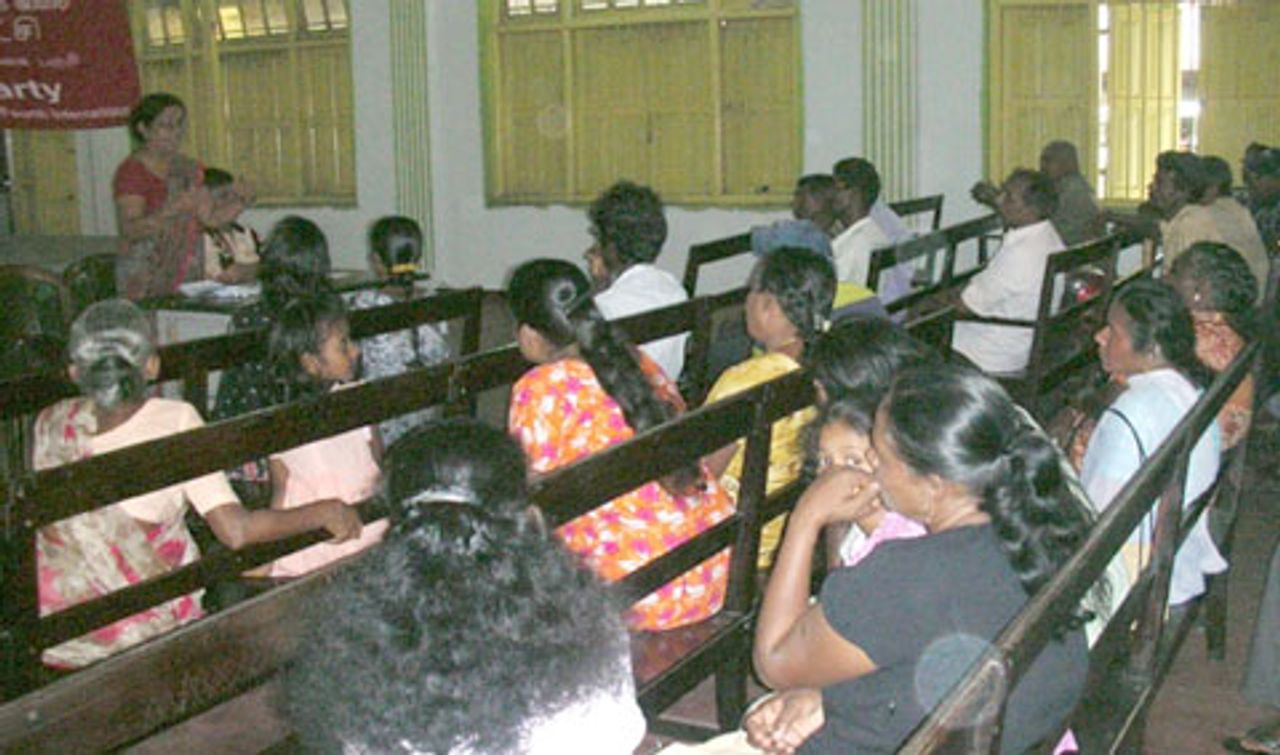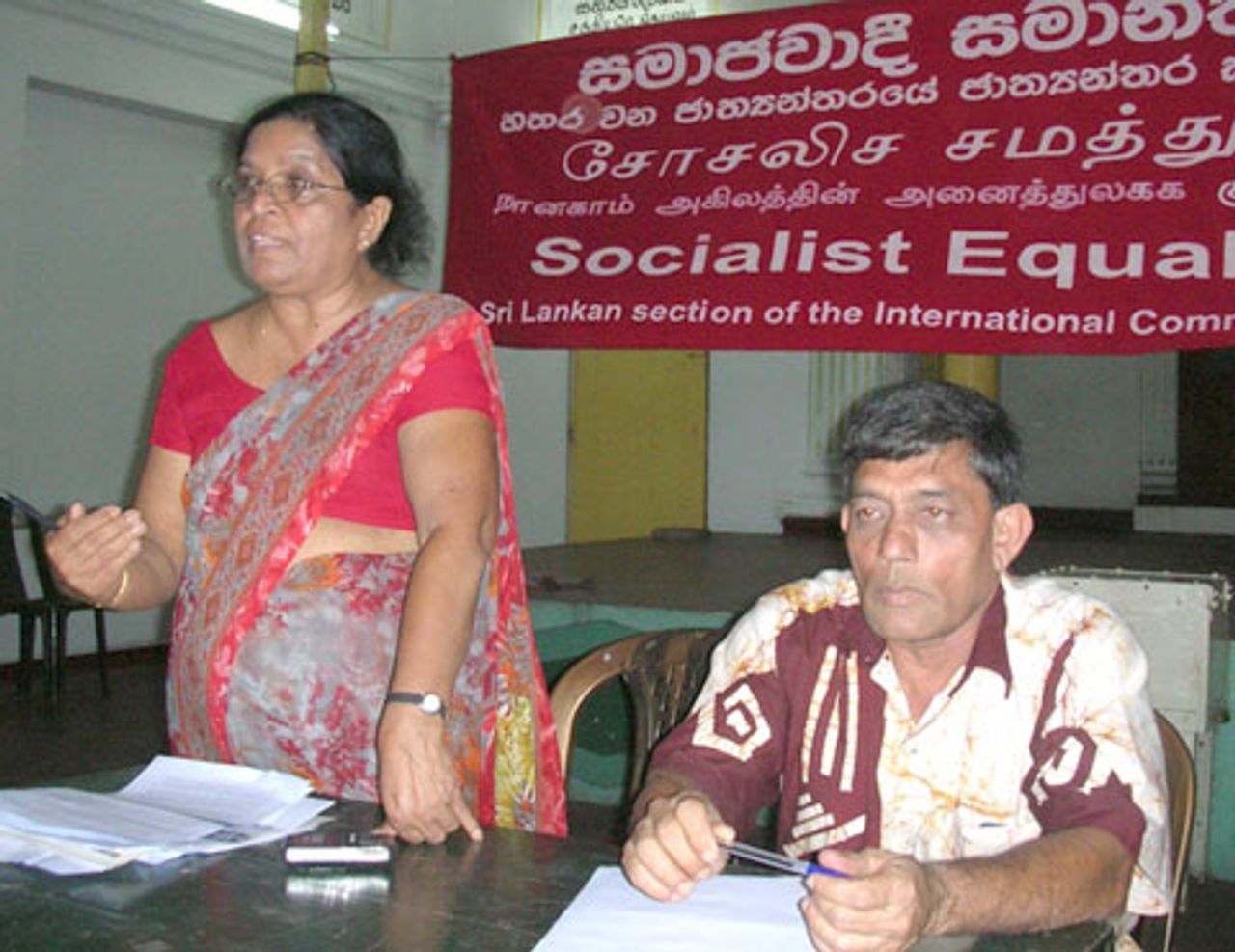Shanty dwellers from central Colombo, who took part in a meeting on September 26 convened by the Socialist Equality Party (SEP), have decided to form an action committee to fight the Sri Lankan government’s plans for mass evictions in the capital.
The Action Committee to Defend the Right to Housing (ACDRH) has taken two decisions. Firstly, it will issue an appeal to other shanty dwellers and to the working class to defend the right to decent housing. Secondly, the committee passed a resolution of support for the rank-and-file committee of General Motors workers in the American city of Indianapolis who are fighting to defend their jobs and wages in opposition to the company and the United Auto Workers union.
The government announced in May that 66,000 poor families, or more than 50 percent of the population of central Colombo, would be evicted as part of its plan to transform the capital into a commercial hub for South Asia. Around 390 hectares will be cleared of slums and made available to local and international investors for property development.
 A section of the Colombo meeting
A section of the Colombo meetingThe SEP has been campaigning against the proposal among slum dwellers and other sections of workers via the WSWS and local meetings in the affected areas. About 30 shanty dwellers took part in the SEP meeting and responded enthusiastically to the call for an action committee.
SEP political committee member W.A. Sunil, who chaired this meeting, welcomed the participants and outlined the history of planned mass evictions. “The City of Colombo Development Plan was first gazetted in 1999 but it was shelved as the government feared an eruption of popular opposition,” he said.
“After the war against the separatist Liberation Tigers of Tamil Eelam ended in May last year, President Mahinda Rajapakse declared an ‘economic war’ in the name of nation-building. This is an economic policy against workers and other oppressed people in the interests of local and international big business. The eviction of shanty dwellers is a part of this war.”
SEP political committee member Vilani Peiris gave the main report. “Many of the families who are being targeted have lived in their houses for decades,” she said. “The majority of people are registered on the electoral lists as residents of these houses and have voted in the past elections. They are paying electricity and water bills. Some even have [land] deeds. Now the Rajapakse government has suddenly found that these houses are ‘unauthorised’.”
 Vilani Peiris speaking and W. A. Sunil
Vilani Peiris speaking and W. A. SunilIn an unprecedented move, Peiris explained, President Rajapakse has put the Urban Development Authority (UDA) and the Land Reclamation and Development Board (LRDB)—two civil bodies—under the control of the defence ministry, controlled by his brother, Defence Secretary Gotabhaya Rajapakse. On August 12, the cabinet approved a defence ministry plan for mass evictions.
Peiris said the defence ministry has begun to use the military methods of the civil war against the city’s poor. In early May, the defence ministry mobilised hundreds of police and the army to suppress protests against the demolition of the homes of 45 families on Slave Island in central Colombo. In July, hundreds of police and soldiers rounded up around 8,000 slum dwellers at Mattakkuliya in Colombo’s suburbs after people demonstrated against the arrest and beating of a local youth by police.
Peiris pointed out that the government’s claims that those evicted would be provided with new homes are false. Already, there were evicted families who had not been provided with houses. To accommodate everyone evicted, the government would have to build 66,000 houses, but nothing on such a scale was even planned. Thousands of families had been issued with tokens marking them for eviction.
The speaker explained that the government is changing the laws to cut off all means of legal redress for those who lost their homes. It had also announced the abolition of the Colombo Municipal Council (CMC) and its replacement by an unelected authority operating under the defence ministry. “The eviction of people from their homes is a violation of their inalienable right to housing,” she said.
The lack of decent houses for the poor in Colombo city and the country as a whole is the responsibility of successive governments and the capitalist system, Peiris said. “According to government reports, more than a million people in Sri Lanka have no shelter. The major opposition parties—the United National Party (UNP) and the Janatha Vimukthi Peramuna (JVP)—have no plan to protect slum dwellers because they both follow the pro-market policies of the Rajapakse government.”
Peiris said the SEP is calling on the working class to come to the assistance of the urban poor by opposing the evictions and banning any involvement in such operations. Billions of rupees were needed to provide proper houses with full amenities for all people. But under the profit system, this could not be achieved. She explained that the SEP fights for socialist policies and a workers’ and farmers’ government as part of the broader struggle for socialism in South Asia and internationally.
A lively discussion opened up after Peiris’s report, with many of those present wanting to explain their own experiences.
Raja told the WSWS: “I agree with your policies. Without appealing to workers and without their support we cannot protect our houses. UNP leader Ravi Karunanayaka instructed us to file a court case. We have done that. But for each court date, we have to pay 1,500 rupees [$US14] to the lawyer from each household. The monthly income of most families is less than 3,000 rupees.”
A female garment worker said: “We have already been given notice to leave our home since we are living close to the railway line. The officials say that we are living on railway reservation land. Yes, we know that living close to the railway is dangerous. We would like to live in a proper place without any danger and with facilities. But the government must give us a proper and suitable place before evicting us.”
Those at the meeting agreed to form an action campaign to fight for decent housing. At a subsequent meeting on October 3, the action committee was formally established. Discussion focussed on the need to campaign more broadly in the shanty areas of Colombo to gather support.
SEP members spoke of the decision of workers at the General Motors Stamping Plant in Indianapolis to form their own rank-and-file committee to fight the cutting of wages and destruction of jobs. Those present identified with the need for a campaign independent of the trade unions, and the committee passed a resolution in support of the Indianapolis workers as follows:
To the comrades of the Rank and File Committee at the GM Stamping Plant in Indianapolis,
We, slum dwellers in Colombo, the capital of Sri Lanka, who are facing the danger of being evicted from our houses in Colombo, would like to extend our heartiest greetings and warm support to you, fighting to defend your wages and jobs against General Motors, the United Auto Workers (UAW) and J.D. Norman, (the possible buyer of this plant).
While you, in the US, are fighting against moves to drive down your living conditions, cutting your wages in half, we, in Colombo, Sri Lanka, are involved in a struggle to defend our housing rights.
Under the “economic war” waged by the regime of President Mahinda Rajapakse for the interests of international capital, Colombo city is being transformed into a commercial hub for South Asia. As a part of that, plans have already been made to forcibly evict us, 66,000 families of poor workers and oppressed people, and to hand over the land to international and local investors.
Your determined struggle in the US encourages us more and more and also acts as a vital guiding light for us.
We see your committee and its program as a powerful step forward towards independent action by the working class and determining your path by yourselves—i.e., to emancipate yourselves, against the UAW, which has collaborated in cutting your wages for the interests of international capital.
We too, in our fight for housing rights, are involved in a struggle through an action committee with our own leadership and our own program, rejecting so-called legal action and the tactic of pressurising the government promoted by the main opposition United National Party (UNP) and Janatha Vimukthi Peramuna (JVP) and various left parties.
We understand the essential nature of international support and the unity of workers and the oppressed—to us your support and to you our support—in the struggle against capital. We see our support for you as a new step toward such international solidarity.
Yours fraternally,
Action Committee to Defend the Right to Housing (ACDRH)
Colombo, Sri Lanka
